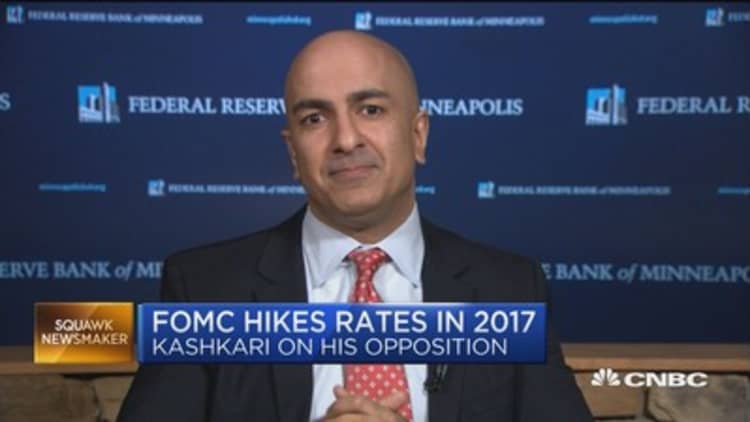The Minneapolis Federal Reserve proposed a set of sweeping new regulations Wednesday aimed at reducing the risk big banks pose to the economy.
At the core of the recommendations are higher capital requirements for the nation's largest financial institutions as well as a reduction in burdens for smaller regional and community banks. The proposals also take aim at so-called shadow banks — nonbank lenders — which are targeted for sharp taxes on the bigger firms.
In total, the proposal offers a contrast with the current regulatory aims of the White House, which is seeking to reduce many of the banking rules imposed by the Dodd-Frank reforms, adopted in the wake of the 2008 financial crisis. Incoming Fed Chairman Jerome Powell also has indicated that a lighter touch is likely for regulations.
"With today's strong economy, now is the perfect time to act to strengthen our financial system," Minneapolis Fed President Neel Kashkari said in a statement. "We must not wait, and we must not go backwards. If we wait until the next crisis to implement these reforms, it will be too late."
However, the proposals are non-binding and likely face a high bar for approval.
"Kashkari's approach to bank capital is simplistic in the extreme. He doesn't seem to understand that we've already de-risked the banking system to a large degree," said Christopher Whalen, head of Whalen Global Advisors, an investment banking and consulting services firm for institutional investors. "What he's proposing is unnecessary, and I doubt it would ever get any support in Washington."
Kashkari has long railed against big banks, arguing that even the sweeping Dodd-Frank bill did not end the issue of too big to fail.
Under the proposal released Wednesday, banks with assets of more than $250 billion — the top 13 institutions — would be required to issue equity equaling 23.5 percent of risk-weighted assets, with a leverage ratio of 15 percent, or nearly double the current 8 percent requirement. Doing so would reduce the chances of a public bailout from 67 percent to 39 percent, according to the Fed branch's calculations.
The plan also would call on the Treasury secretary to declare that large banks "are no longer systemically important," a vital provision that would determine whether those institutions would get a publicly funded rescue. Those banks that aren't certified, and thus open to bailouts, would be required to increase their capital ratios to as high as 38 percent.
"Kashkari has been banging on this drum for a while. His solution is looking for a problem," said Whalen, who added that he would like to publicly debate Kashkari on the proposal. Whalen pointed out that Kashkari already has run for governor of California, and may have future political ambitions. "I don't think Mr. Kashkari's proposal has any chance of success. He's clearly playing to a progressive audience, which also doesn't understand any of these things."
Kashkari was not available for reaction to Whalen's comments.
During a presentation Tuesday, Kashkari acknowledged that he has been politically active but said he and his family have settled in Minnesota and he is enjoying his job.
Under his proposal, shadow banks also would come under increased scrutiny, with those having assets greater than $50 billion subject to a 1.2 percent tax on borrowings. Those that the Treasury secretary refuses to certify as systemically important would face a 2.2 percent tax.
Finally, the Minneapolis plan calls for a reduction in "unnecessary regulatory burden" on community banks.
"The plan would fundamentally change the nature of community bank supervision, effectively limiting supervision to those aspects of community banking that pose real risk," the Fed branch said.
The proposals follow a two-year review by the Minneapolis Fed that sought to address the "continuing risk" posed by too-big-to-fail institutions.
"After witnessing the economic devastation from the 2008 financial crisis, I am committed to working with other policymakers to strengthen our financial system and reduce the danger of a future crisis," Kashkari said.
WATCH: Kashkari explains his position on interest rates



